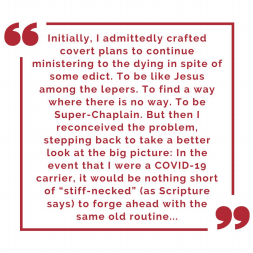By Sue Witty
Many chaplains have published articles in the past month that underscore the creative changes their ministries have undergone, their teamwork with medical professionals, and awe-inspiring sides of all to which they have borne witness. In this reflection, I elected to speak to the losses.
Implementation of the COVID-19 “emergency operations plan” and visitation restrictions seemed to arise as suddenly as the construction of the Berlin Wall — overnight. And not some theoretical overnight, either. “Effective immediately, social workers and chaplains, like family members, will not be permitted to visit with patients and families in person until further notice.”
Initially, I admittedly crafted covert plans to continue ministering to the dying in spite of some edict. To be like Jesus among the lepers. To find a way where there is no way. To be Super-Chaplain. But then I reconceived the problem, stepping back to take a better look at the big picture: In the event that I were a COVID-19 carrier, it would be nothing short of “stiff-necked” (as Scripture says) to forge ahead with the same old routine.

Effective immediately, I lost all physical contact with people I had grown accustomed to seeing every week for the past several months or even, in numerous cases, up to the past year.
Effective immediately, my ministry had to shift, focusing on family members and facility staff. Only the handful of hospice patients (whose illnesses left their cognitive abilities relatively intact) were able to receive calls from the social workers and me. But for the most part I swiftly invested my energies – once dedicated to the dying and “transitioning” souls – into the caregivers, relatives and loved ones of those whose lives were ending. As for those whom I might consider “the least of these” – in our nursing homes, waiting for visitors (or if not actually waiting, then at least responding positively to the stimulus of a visit) – I could only send cards, inquire via phone calls to the nursing station about their current status, and pray. Oh. And weep. Just as Jesus wept.
Effective immediately, life became a waiting game. Patients and facilities that seemed “safe” from mid-March to mid-April suddenly began reporting in late April that two patients “tested
positive.” Then six patients. Then the entire memory unit in any given facility was infected. And then, the death toll.
On April 30, knowing I felt overwhelmed by the absolute multitude of deaths, a dear friend and fellow minister asked me to describe my emotional response. She said, “I imagine you feel helpless, not being able to be there with them or to offer words of comfort as they are dying. That must compound your grief.”
“Yes,” I replied. “That is definitely true. But it also all reminds me of something Morgan Freeman’s character, Ellis Boyd ‘Red’ Redding, says toward the end of The Shawshank Redemption, reflecting on the loss of Andy Dufresne:
Ït makes me sad … (but) I have to remind myself that some birds aren’t meant to be caged. Their feathers are just too bright. And when they fly away, the part of you that knows it was a sin to lock them up DOES rejoice. But still, the place you live in is that much more drab and empty that they’re gone. I guess I just miss my friend.
My patients are my friends. And all at once, almost all of my friends are gone. I guess I just really miss my friends.
Sue Witty is an Alliance-endorsed chaplain.



Recent Comments